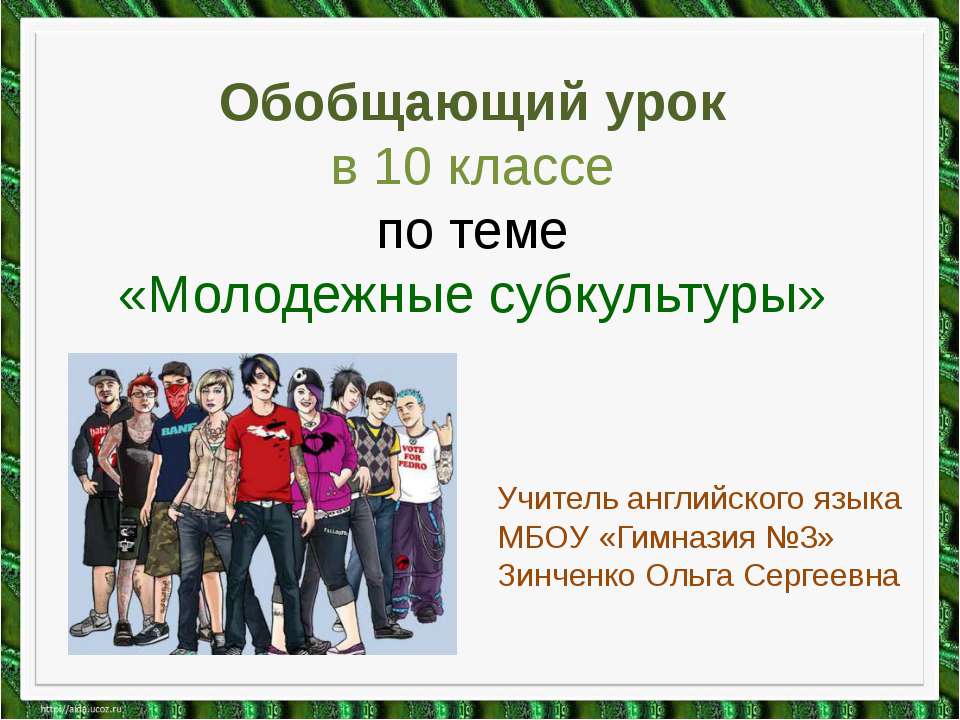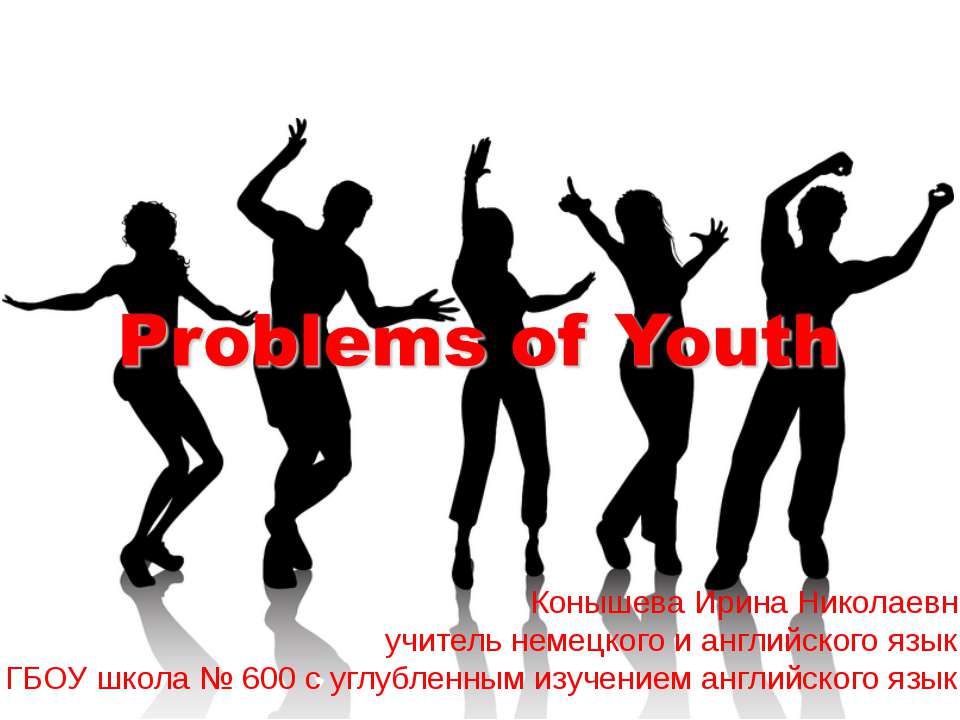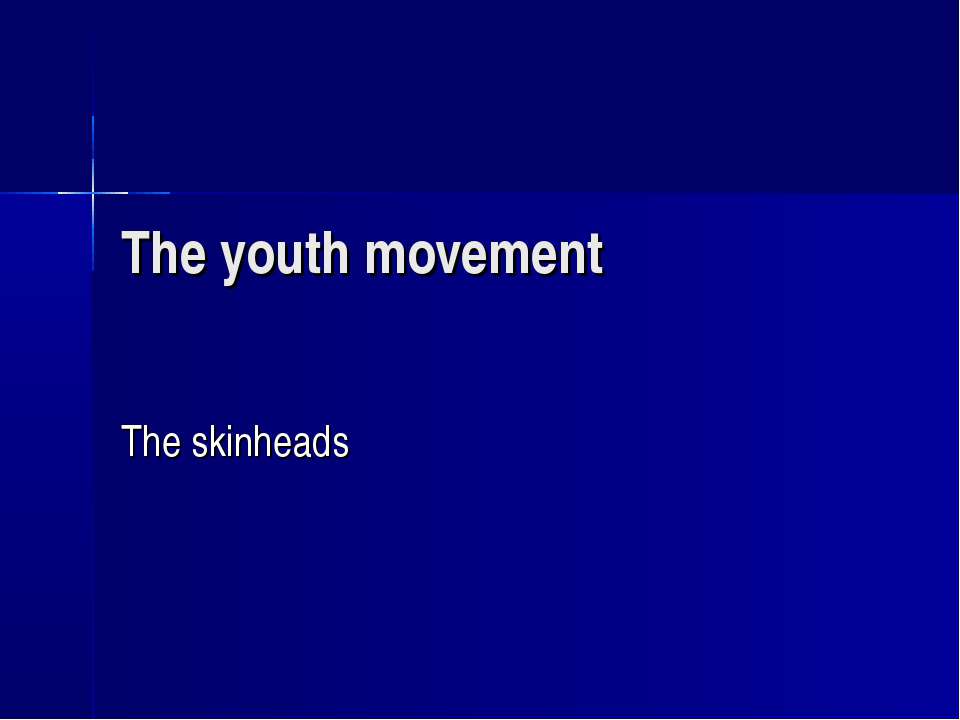Youth subcultures

- Рубрика: Презентации / Презентации по английскому языку
- Просмотров: 448
Презентация "Youth subcultures" онлайн бесплатно на сайте электронных школьных учебников edulib.ru
Students of the 10th form: Pribytkova Daria Pribytkova Ksenia Teacher: Grigorieva Victoria Alexandrovna Kuloy, Arkhangelsk Region, school №90 2013
Subculture is a particular part of the society that differs from the culture, adopted by the majority. People unite in groups according to their interests, beliefs and behavior. Subcultures have their special views of the world, behavior, fashion , music and language. Different subcultures began to appear in the second half of the last century, when European culture was in the era of postmodernism.
More often subcultures are self-contained and aspire to isolation from the mainstream culture. It is caused by the origin of subcultures and the desire to show off. Now there are so many subcultures that it is difficult to talk about all of them. We can tell you only about the most popular ones.
Goths It is a subculture that arose in the late 70s of the XX century, the UK-based punk movement. Gothic subculture is varied and all its members are characterized by the specific image and interest to Gothic music. Now the world subculture is represented by people aged 14 to 45 and older. The development of the Gothic subculture was closely linked to the evolution of the musical genre of gothic rock. In the XX century, the Gothic subculture was divided into several independent streams. Despite the fact that the Goths have negative attitude to modern society, they are able to integrate into it successfully. Different social researchers and scientists have concluded that this subculture should be taken only as a community of people who share certain interests.
Goths wear extraordinary clothes, usually black in color. Their articles of clothes are full of details: grid and metal jewelry (rings, earrings, pendants, etc.). More over, both men and women use cosmetics. It allows to create a grim image. Because of this, the mass media often discuss the distorted and negative image of the Gothic subculture. They are often taken for Satanists but Goths have nothing to do with them.
Hip-Hop Hip-Hop is a cultural sector, which originated among the working class of New York. In the 1970s hip-hop became the part of the youth culture in many countries. Its main idea is the protest against inequality and injustice. Hip-hop is divided into a set of trends. Each trend is independent and has its own meaning. We can distinguish three main groups: Music - rap, hip-hop, Beatboxing; Dance - Breakdance, Hip-Hop, Papping, Crump Flexing, C-Walk, Turfing, Locking, Waacking, Dancehall, House; Visual – Graffiti. Despite the fact that hip-hop fashion varies, it has special features, for example, free clothes and sports style: sneakers and baseball caps, T-shirts and basketball shirts, jackets, hooded sweatshirts, baggy pants. They like massive jewelry (chains, medallions, key chains).
Emo Emo is a youth subculture and a style of music, dressing and demeanor. It was begun in the 1980s in the USA. They are distinguished by self-expression, special and sensual perception of the world. Very often these people are vulnerable and depressed. Traditional emo hairstyle is oblique bangs covering eyes. Preference is given to hard straight black hair. Girls may be childish, funny hairstyles are two "little tails," bright "Clip - hearts" on the sides, bows. The main colors of the clothes are black, pink and white. Many youth subcultures have a sort of aversion to the emo, which is expressed in derision of their appearance, criticism of ideas and musical preferences. Some people believe that the representatives of this subculture are depressed and that`s why they can commit suicides.
Scene Kids Scene Kids is a young musical subculture formed from the English one. Their basic rule is wearing the clothes that contradicts the fashion trends and disregards all the social norms. At the same time in this subculture the fashion, associated with youth movements of 2000, is saved. It is considered that today's Scene Kids were influenced by emo culture and, as a result, there`s a mixture of these two subcultures. So parents can have a negative attitude to their hobby, believing that it is the cause of suicides and depression.
Hippie It is a sort of philosophy and this subculture arose in the 1960s in the USA. Hippies protest against the Puritan morality of some protestant churches and also they want to return to the natural purity through love and pacifism. One of the most famous slogans of the hippies is «Make love, not war!». Hippies believe: - people should be free; - freedom can be achieved only by changing the internal structure of the soul; - actions of people are determined by the uninhibited desire to preserve their freedom as a great treasure; - beauty and freedom are identical to each other; - spiritual community is an ideal form of coexistence.
Skinheads The first time when this subculture appeared in England was in the late 60's. One of the first names of the subculture was «Hard Mods». There are several groups of young people, who call themselves "skinheads": - Traditional skinheads stick to the original subculture and beliefs. - Hardcore skinheads became prevalent because they kept the old ideas and had no racial prejudice. - White Power skinheads appeared in England in the first half of the 70s. They stick to the ideologies of the nationalists and racists. - S.H.A.R.P. appeared in America in 1980 as a reaction to the opinion of mass media that all skinheads were Nazis. - R.A.S.H. inherited the ideas of socialism, communism, anarchism.
Punks This subculture appeared in the late 60s - early 70s in the UK, USA, Canada and Australia. The characteristic feature of the subculture is their critical attitude to society and politics. Punks have got a colorful and outrageous image. Many punks dye their hair in bright unnatural colors, tease and fix them with hair spray, gel and other methods. In 1980s a special hairstyle was popular among punks. They wear skulls and other accessories (collars, wristbands, bracelets) and tattoos.


















